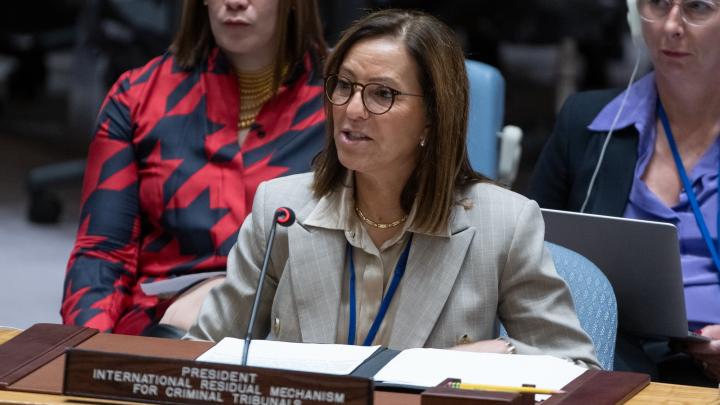President Gatti Santana briefs the UN Security Council on progress of Mechanism work

The President of the International Residual Mechanism for Criminal Tribunals (Mechanism), Judge Graciela Gatti Santana, today presented the Mechanism’s twenty-third progress report to the United Nations Security Council (Council) in New York.
President Gatti Santana began her address by highlighting the historical significance of the Genocide Convention and the Universal Declaration of Human Rights, adopted 75 years ago, which she described as “a cornerstone for the Yugoslav and Rwanda Tribunals”.
The President then informed the Council that the Mechanism has transitioned to its new, truly residual phase. She provided an update on recent decisive events, in particular the completion of active trials and appeals related to core crimes. Here, she referred to the case against Félicien Kabuga, including the issue of his pending provisional release and the Mechanism's efforts to recover expenses related to his defence. Separately, President Gatti Santana congratulated Prosecutor Serge Brammertz and his team on their progress with regard to the Mechanism’s fugitive tracking responsibilities. Following the Prosecutor’s announcement of the death of Aloys Ndimbati, who was first indicted by the International Criminal Tribunal for Rwanda in 1995, there remain only two fugitives, both of whom are expected to be tried in Rwanda in line with the relevant referral decisions.
President Gatti Santana emphasised that, with the main judicial workload inherited from the ad hoc Tribunals substantively concluded, the Mechanism is now focused on planning for the future and winding down its operations. Accordingly, she has adapted the priorities of her Presidency to better reflect this new chapter in the Mechanism’s life, committing to transparency, good governance, and preserving a shared legacy of accountability. The President explained that, as part of her first priority, she has presented a draft 'Framework of Operations to Complete Functions' to the Council’s Informal Working Group on International Tribunals. This comprehensive document is designed to assist the Council in its upcoming fifth review of the Mechanism’s progress of work.
Turning to other matters, President Gatti Santana indicated that the Mechanism continues to face post-judgement challenges that were not foreseen when the ad hoc Tribunals were set up. In the area of sentence enforcement, for example, the Mechanism urgently needs additional States to volunteer to assist, following the recent return of several convicted persons to the United Nations Detention Unit in The Hague. The President also drew attention to the unacceptable situation of the seven relocated persons in the Republic of Niger, who have now endured de facto house arrest for two years. With no solution in sight, despite the Mechanism’s efforts, she likewise urged States to assist in any way possible.
In addition, the President spoke of the disturbing trends of genocide denial and revisionism that threaten to undermine the Mechanism's work. Observing that “protecting the truth is the best way to prevent atrocities from occurring again”, she stressed the pivotal role that States can play, as well as the importance of ensuring access to information. She noted that the Mechanism itself is actively engaged in these efforts, facilitating information centres in line with resolution 1966 (2010) and conducting outreach activities funded by the European Union.
Finally, the President cited the Republic of Serbia's ongoing failure to execute arrest warrants in the Jojić and Radeta contempt case. Such behaviour, she said, not only seeks to weaken the Mechanism’s judicial process but also directly challenges the authority of the Security Council.
In closing, President Gatti Santana underscored the Mechanism’s commitment to doing everything within its power to ensure the optimal conclusion of its remaining activities, and stated that its valuable legacy “requires that the ground-breaking work started by the ad hoc Tribunals be completed in a way that honours the promises made by the United Nations 75 years ago.”